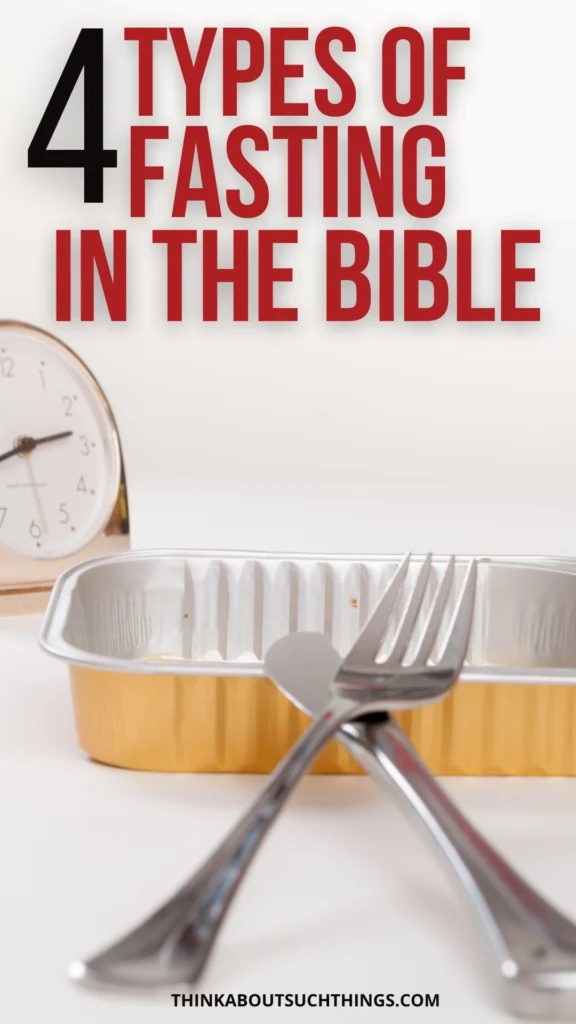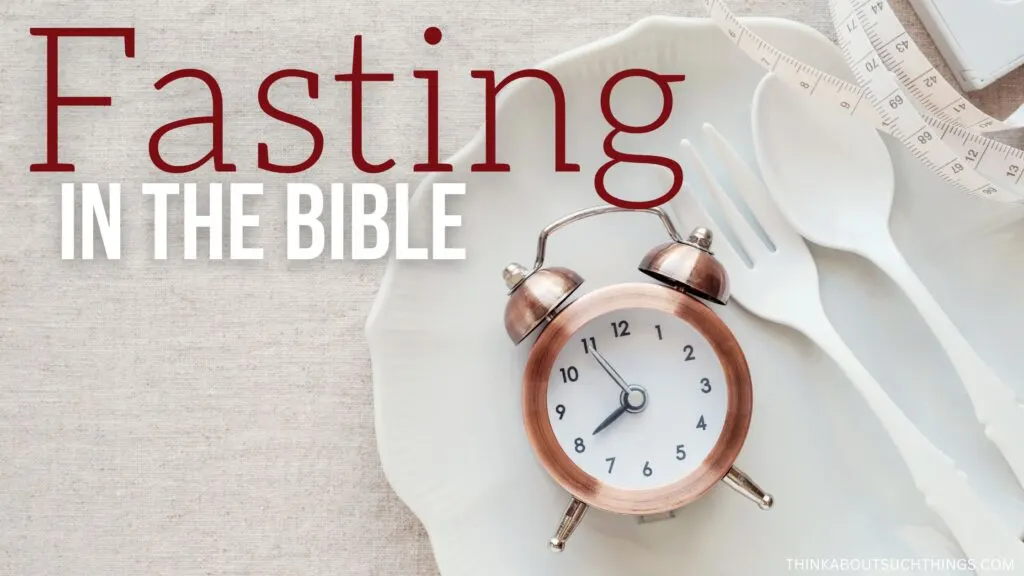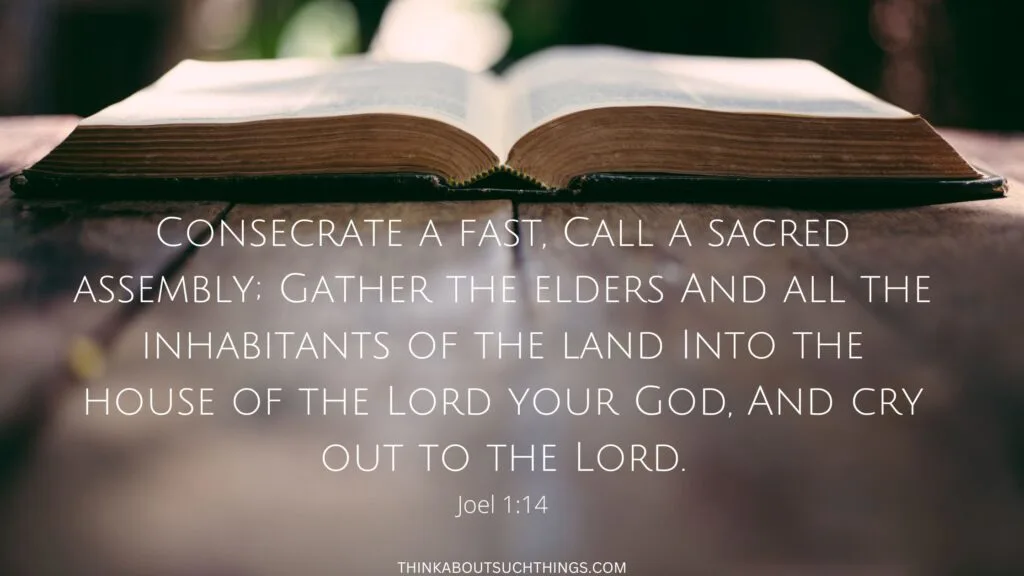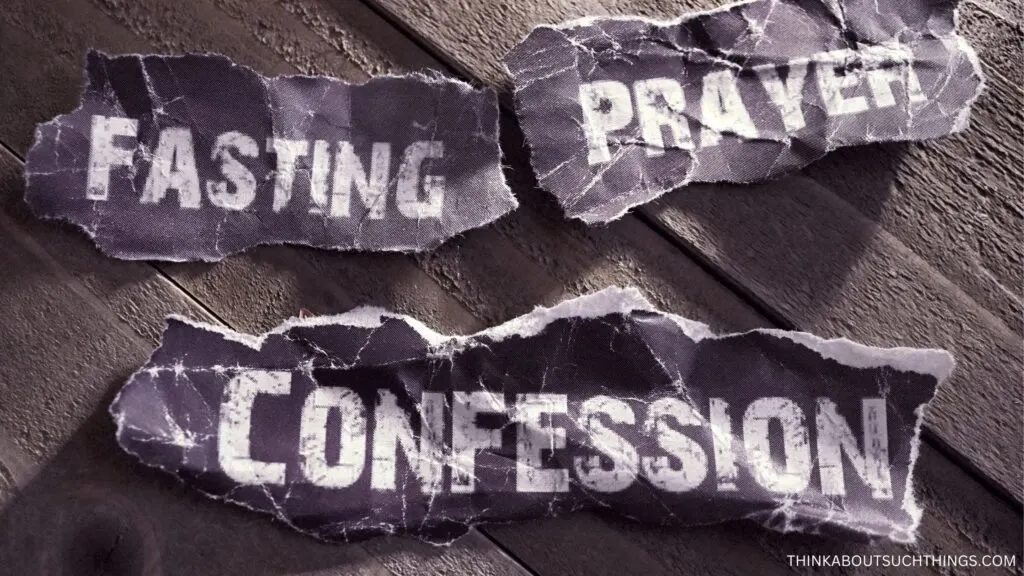In this article, we will look at the different types of fasting in the Bible and how as Christians we can practice fasting to draw closer to God. So, grab your Bible, and let’s get started…
For many Christians, fasting is a method to show repentance, hunger, and humility to God. It can also be used to draw closer to Him, and receive His guidance and direction. In addition, modern-day fasting has become increasingly popular and it is associated with health and wellness, which is not part of the Biblical view of fasting.
I guess that if you are here, you really want to learn not about the health benefits. But what does the Bible say about fasting?
The Bible mentions four distinct types of fasting: absolute, normal, partial, and corporate fasting. Each type of fasting has precise suggestions regarding what to eat and drink during the designated fasting period. Invariably, the goal is to become closer to God and receive guidance or an answer to a request.
Periods of fasting are practiced by many faiths, not simply Christianity. Purification is one method, while mindfulness and repentance are two others. Dig into the Bible’s teachings on fasting and look at real-life accounts of people who abstained from food and drink throughout their fasts to learn from their experiences.

Exploring The Types Of Fasting In The Bible

Fasting is and should be a spiritual practice for every Christian to get closer to God and ask for His will and direction. Fasting is commonly done in conjunction with prayer and other spiritual activities. I am sure you have heard the phrase “prayer and fasting” many times. This is because they were usually done together. And It’s essential to remember that fasting in the Bible wasn’t always done for health reasons but rather for spiritual ones.
Now, let’s look at the four Biblical categories for fasting…
Absolute or Complete fast
This is where a person abstains from all food and drink. The fasts that the biblical figures Jesus, Moses, and Elijah endured serve as examples. Although there is no set period to commit to this fast, many agree to 7 or 40 days.
Moses: Exodus 34:28 – “So he was there with the Lord forty days and forty nights; he did not eat bread or drink water. And he wrote on the tablets the words of the covenant, the Ten Commandments.”
Elijah: 1 Kings 19:8 – “So he arose and ate and drank, and went in the strength of that food forty days and forty nights to Horeb, the mountain of God.”
Normal Fast
This is where a person abstains from all food but still drinks water. This was the most common type of fast mentioned in the Bible and was often undertaken as a sign of repentance, mourning, or as a means of seeking guidance from God. Although there is no set period to commit to this fast, many agree to fast from sunrise to sunset, 1 full day, 3 days, 7 days, or 21 days.
Joel 2:12 – “Now, therefore,” says the Lord, “Turn to Me with all your heart, with fasting, with weeping, and with mourning.”
Psalm 35:13 – “But as for me, when they were sick, my clothing was sackcloth; I humbled myself with fasting; and my prayer would return to my own bosom.”
Ezra 8:21-23 – “Then I proclaimed a fast there at the river of Ahava, that we might humble ourselves before our God, to seek from Him the right way for us and our little ones and all our possessions. For I was ashamed to request of the king an escort of soldiers and horsemen to help us against the enemy on the road, because we had spoken to the king, saying, ‘The hand of our God is upon all those for good who seek Him, but His power and His wrath are against all those who forsake Him.’ So we fasted and entreated our God for this, and He answered our prayer.”
Partial Fast
This is where a person abstains from certain types of food or drink but consumes other foods. Daniel undertook an example of this fast: he abstained from all rich foods and only ate vegetables, pulse, and water. Daniel fasted for 21 days, and many Christians launch this 21-day fast every year, especially at the beginning of the year. It is a great way to dedicate your life, plans, and year to the Lord.
Daniel 10:2-3 – “In those days I, Daniel, was mourning three full weeks. I ate no pleasant food, no meat or wine came into my mouth, nor did I anoint myself at all, till three whole weeks were fulfilled.”
Corporate Fast
A group of people may decide to fast as a show of remorse or repentance. Another way is for the group to consult God about making a significant life decision. The story of Esther is a great example of a corporate fast.
And God commanded the Israelites on many occasions to call a day of fasting. This corporate fast is a great way to create unity and purpose in a group. Churches sometimes have to make significant decisions. They then call for a corporate fast.
Joel 1:14 – “Consecrate a fast, Call a sacred assembly; Gather the elders And all the inhabitants of the land Into the house of the Lord your God, And cry out to the Lord.”
Nehemiah 9:1-2 – “Now on the twenty-fourth day of this month the children of Israel were assembled with fasting, in sackcloth, and with dust on their heads. Then those of Israelite lineage separated themselves from all foreigners; and they stood and confessed their sins and the iniquities of their fathers.”
>> Check Out – 19 Powerful Bible Verses about Fasting
10 Examples Of People Fasting In The Bible

- First, Moses: Before receiving the Ten Commandments from God at Sinai, he fasted for 40 days and nights (Exodus 34:28).
- To get direction from God, Elijah spent 40 days and nights in the wilderness fasting (1 Kings 19:8).
- Thirdly, Daniel only ate vegetables and drank water for 21 days while fasting and praying to God for direction (Daniel 10:2-3).
- Number four, Anna, a prophetess at the temple, is said to have spent nearly all her time praying and fasting (Luke 2:37).
- To prepare for His ministry, Jesus fasted in the wilderness for 40 days and nights (Matthew 4:2).
- The followers of John the Baptist fasted to demonstrate their sorrow for sin (Matthew 9:14).
- When it came time to find Judas’s replacement, the apostles fasted and prayed (Acts 1:14).
- Paul: Before making major decisions or setting out on missionary missions, Paul would fast and pray (Acts 9:9, 13:2-3).
- Cornelius, a Roman centurion, was visited by an angel after he fasted and prayed (Acts 10:30).
- Esther: Before going to the king to beg for her people, Esther fasted and prayed for three days (Esther 4:16).
Are Christians Commanded To Fast In The New Testament?
According to the Bible, fasting is not a requirement for believers. However, fasting is described as a spiritual practice that can be undertaken by believers as a way to draw closer to God and seek His guidance and direction.
In the New Testament, Jesus teaches about fasting, suggesting that it is a personal choice rather than a requirement for all believers. For example, Jesus said in the Sermon on the Mount:
“When you fast, do not look somber as the hypocrites do, for they disfigure their faces to show others they are fasting. Truly I tell you, they have received their reward in full. But when you fast, put oil on your head and wash your face, so that it will not be obvious to others that you are fasting, but only to your Father, who is unseen; and your Father, who sees what is done in secret, will reward you” -Matthew 6:16-18
This passage suggests that fasting is a personal spiritual discipline that is meant to be between an individual and God rather than a means of seeking attention or approval from others. Some use this verse to say that all Christians should fast since it says, When you fast, not IF you fast.
Like all forms of prayer, fasting seeks God’s presence, wisdom, and guidance in our lives. But it is important to remember that God is not a vending machine or a magical genie in a bottle who grants all your wishes. Fasting should not be approached with the expectation that it will automatically produce a particular outcome or result.
According to the Bible, God does things when He wants to and how He wants to. He has perfect timing and knows what is best even when we think we know better. For that reason, while fasting can be a powerful tool for seeking God’s will and guidance, it is crucial to approach it with humility and recognize that we are not in control of the outcome. Or that God will do XYZ if I do XYZ.
Fasting is a powerful spiritual discipline, but it should never be used as a weapon against God or as a way to “turn his arm” (manipulate). Instead, it should be viewed as an opportunity to humbly submit to God’s will and ask for His help.
Here is a table to summarize the main categories and types of fasting in the Bible and some examples of people who put them into practice. I hope you find it helpful.
>> Check Out – 7 Amazing Spiritual Benefits of Fasting
Types of Spiritual Fasting Chart
| FAST | DURATION | ALLOWED FOODS | ALLOWED DRINKS | NOTES |
|---|---|---|---|---|
| Absolute Fast | Suggested 7 or 40 days | None | None | See notes on Jesus, Elijah, and Moses |
| Normal Fast | Suggested sunrise to sunset, 1 full day, 3 days, 7 days, or 21 days. | None | Water | As described in Joel 2:12 |
| Partial Fast | You and God decide | Limited to specific types of foods or drinks | Water, broth, and other clear fluids | The specifics of the fast will depend on the foods or drinks that are abstained from. |
| Corporate Fast | Those involved come to an agreement. You can also do a chain fast where members choose a day to fast over a period. | Limited to specific types of foods or drinks | Water, broth, and other clear fluids | The specifics of this fast will depend on the foods or drinks that are abstained from, as well as the goals and purpose of the fast. |
| Daniel Fast | 21 Days | Vegetables, fruits, and Pulse | Water | Meat, dairy, and processed foods are abstained from. |
| Esther Fast | 3 Days | None | Water | As described in Esther 4:16. |
| Nineveh Fast | 3 Days | None | Water | As described in Jonah 3:5-10. |
| Elijah Fast | 40 Days | None | None | As described in 1 Kings 19:8. |
| Jesus Fast | 40 Days | None | None | As described in Matthew 4:1-2. |
| Moses Fast | 40 Days | None | None | As described in Exodus 34:28. |
Fasting According to the Bible: Preparing
Please consult your doctor before fasting to ensure it’s safe and right for you. Not everyone can handle the stresses of fasting and what it does to the body. Define your goals and purpose and speak to a medical professional.

When starting a spiritual fast, it is wise to have a plan of action. This helps you focus your thoughts and prayers during the fast. Choose a period based on your goals, physical and emotional preparation, and other needs. Start with shorter fasts and gradually increase the length rather than trying a longer fast too soon.
Plan your meals and drinks and have the required supplies on hand. Make sure you obtain adequate nutrition during a partial fast. Please pay attention to your body during your fast. You will sometimes feel you can’t make it, but try to push through. Stay hydrated and watch for indications of severe pain.
Fasting is a solid spiritual practice. Therefore, seek God’s guidance during your fast. Pray, meditate, and seek support and advice from other believers. Expect to be tempted and spiritually attacked while fasting. This is normal. Even Jesus, our Lord, was tempted while fasting.
But also realize that sometimes when fasting you become spiritually sensitive and even your spiritual gifts might be heightened.
What If You Fail To Complete A Fast?
Not completing a fast is not a failure or a sin. But be honest with yourself and understand that fasting can be difficult. Therefore, it’s normal to face challenges or setbacks. Some suggestion before trying again is to remember that fasting is a spiritual practice, not a test of willpower or strength. If you can’t finish your fast, don’t beat yourself up.
Also, please realize that if God is calling you to fast He will also give you the grace you need to accomplish the fast. That doesn’t mean you won’t be tempted to eat but He will help you through the fast. I have definitely felt when I fasted with God’s grace and when I have fasted in my own strength.
If you need more support to complete your fast, seek support from fellow believers. Ask a pastor, mentor, or trustworthy friend for advice and prayer.
Another helpful thing to do is reflect on your fasting experience and what you learned. One way you can do this is by journaling. Some questions you can answer are…
- What was the most challenging about the fast, and what was the best?
- What did the fast teach you about yourself and God?
- Did the Lord speak to you during this time? Were any Bible passages highlighted to you at this time? Dreams? Visions?
- How do you feel spiritual before, during, and after your fast?
Non-Biblical Fasting
As I mentioned earlier in many cultures and religions, fasting is seen as a method to show penitence or humility and receive guidance and direction. Nowadays fasting is associated with health, longevity, and wellness, which is not part of the Biblical view of fasting.
Intermittent fasting, in which food consumption is limited to specific times of the day or week, If you have windows of eating and fasting like 18 hours of fasting then 6 hours of eating. This is an example of a modern-day fast that is not addressed in the Bible.
However, fasting for non-religious reasons is commonly done to improve health and lose weight, as it allows the body to relax and repair itself during times when it is not digesting food. I have done this kind of fasting, but it’s always been with a focus on health. When I fast before the Lord it’s a very different focus and heart posture.
The Bible mentions four distinct types of fasting: absolute, normal, partial, and corporate fasting. And I hope this post has helped you learn about each one and has encouraged you to pursue the Lord more in prayer and fasting. If you would like to leave a review below! I would love to hear from you and what God is doing in your life.

Melissa is a passionate minister, speaker and an ongoing learner of the Bible. She has been involved in church and vocational ministry for over 18 years. And is the founder of Think About Such Things. She has the heart to equip the saints by helping them get into the Word of God and fall more in love with Jesus. She also enjoys family, cooking, and reading.
She has spoken in churches in California, Oregon, Texas, and Mexico and has been featured in Guidepost Magazine and All Recipes Magazine. Read More…
